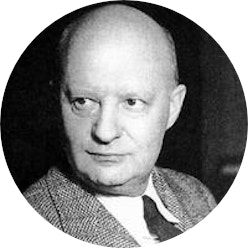
Paul Hindemith
November 16, 1895 - Hanau (Germany) — December 28, 1963 - Frankfurt (Germany)
About
Paul Hindemith, a performer and a composer.
A virtuoso string player, Paul Hindemith performed as the second violin and then violist of the Rebner Quartet, before he founded his own quartet in 1922 (the Amar Quartet). He was also the solo violinist of the Frankfurt Opera from 1915 to 1923.
A great admirer of contemporary music, he particularily loves the music of Schönberg and Webern. He starts composing himself at a very early age, but it is in 1915, at the age of 20, that he receives his first great award from the Mendelssohn-Bartholdy Foundation, for his first string quartet. Between the two world wars, he embodies the German musical avant-garde.
Paul Hindemith escapes the Nazi Germany.
In 1938, because of his bad relationships with the regime, and even though he was strongly supported by the conductor Wilhelm Fürtwangler, Paul Hindemith leaves the Nazi Germany with his wife. They first establish in Switzerland and then fly to the USA, where Hindemith gets the American citizen in 1946. There, he teaches at the Yale School of Music.
In 1953, he returns to live in Switzerland, even though he frequently goes back to Germany. He dies in Frankfurt in 1963 at the age of 68.
During his life, he travelled a lot: in the USSR with the Amar Quartet, in Switzerland and in the USA to escape the Nazis, in Japan, South America and Europe to conduct concerts.
Hindemith's most popular works.
Among his most famous works, we can quote the operas Mathis der Maler (also a symphony) and Cardillac, the piano concerto Klaviermusik mit Orchester (dedicated to the pianist Paul Wittgenstein, who had lost his right arm during the First World War), and many chamber music and symphonic pieces.

